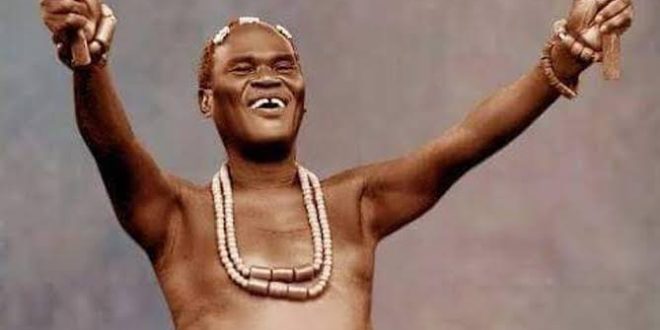
When someone asked who the late Chief Hubert Ogunde is (I prefer to use “is” because his numerous works live on), I found myself at a loss for words. I couldn’t find enough adjectives to describe him, so I simply called him a hero!
Many people refer to Hubert Ogunde as the father of modern Nigerian theatre. However, his impact extends far beyond theatre. He was more than just a musician, dramatist, or any other roles he was known for; he was also an activist and nationalist. Ogunde was a politician whether we like it or not.
Ogunde was a husband and a parent. He was a liberator, a staunch believer in the Yoruba race, and a true Nigerian to the core. He believed in humanity and love. His love for his family, country, and humanity was unwavering. He strongly believed in the triumph of good over evil, which was reflected in his various works and actions.
Indeed, Ogunde was a true nationalist!
The older generation of Nigerians, regardless of their race, who are familiar with the actor, theatre manager, playwright, musician, folklorist, and policeman in him also remember Ogunde as a teacher, activist, and nationalist.
Hubert Ogunde was simply a prophet, a mystical figure, and a spiritualist. Call him any of these and you would not be wrong. Considering his numerous plays, dramas, music, and stories, you will agree with me that he was an extraordinary person. An enigma.
His movies relayed ancestral stories, and those who knew him fondly remember him as the father of Nigerian theatre. While this claim is true, it doesn’t capture the full extent of his legacy as one of Nigeria’s founding fathers.
Born in present-day Ogun State, to Jeremiah and Eunice in July 1916, Hubert Adedeji Ogunde came from a long line of Ifa worshippers. However, his father, Jeremiah, was a Baptist missionary and organist, and young Hubert was raised as a Christian.
Hubert Adedeji attended St. John’s Primary School, Ososa, Ogun state from 1925 to 1928, St. Peter’s School, Faji, Lagos from 1928 to 1930 for his primary education. He then attended Wasimi African School for his secondary education. He later became a teacher at St. John’s Primary School, Osasa, where he started his primary education.
Like his father, Hubert played the organ and was the church choirmaster.
In December 1941, while on holiday in Ibadan, he passed by a police recruitment center and decided to join the Nigerian Police Force. He was recruited and as a young police officer, he was posted to Ebute Metta Police Station in Lagos. That was when he began directing plays for church events.
On June 12, 1944, at the height of the Second World War, his first play, “The Garden of Eden and The Throne of God,” premiered at Glover Hall in Lagos. The play combined Biblical themes with elements of Yoruba culture, marking the beginning of Ogunde’s career as a dramatist.
Ogunde in Theatre
Ogunde eventually left the police force in 1946 to focus on his theatre career. As a young person, he was already exposed to the Yoruba travelling theatre, ‘Alarinjo,’ and had seen masquerade performances during festivals. His career as a dramatist and entertainer benefited immensely from his knowledge of traditional practices gained through his background, his familiarity with the Bible, and the successful plays sponsored by the church early in his career. Ogunde thus managed those multiple identities effortlessly.
According to Ayòdélé Ìbíyemí, his biographer, Professor Ebun Clark noted that “one of Ogunde’s major contributions to the history of professional theatre in Nigeria is that he withdrew the theatre from the direct patronage of court and the church and gave it to the people.”
Ogunde faced many challenges as a theatre pioneer in Nigeria, one of which was recruiting actors and another being making money from theatre.
The first problem was due to the conservative nature of the society. Entertainers were considered not serious by Nigeria’s growing educated middle class. He also had to struggle to convince the audience, who were used to free masquerade performances, to pay for his performances.
Despite these challenges, he successfully founded the African Music Research Party in 1945 to recruit actors and stage plays across the country.
Ogunde , the Politician
Ogunde began staging plays and touring across Nigeria. Gradually, he broke away from staging plays based on Christian themes and began addressing broader, topical issues. He also started an extensive touring schedule that took him to the hinterlands across Nigeria.
This was the era of nationalism, and Ogunde was fully involved in the process through his theatre. He often addressed social issues in his plays, working alongside nationalists such as Samuel Akisanya and Ernest Ikoli, using entertainment as his tool for emancipation.
Ebun Clark noted that Ogunde developed plays “to imbibe cultural pride into Nigerians so they can realise that colonial rule had to stop.” His extensive travels across Nigeria also contributed to the eventual imagining of Nigeria as a single entity by the masses.
When he premiered his play, “Worse than Crime,” in 1945, future Nigerian president, Nnamdi Azikiwe, chaired the event. The play showed the people that colonialism was worse than common crimes society openly punished.
In October 1946, Ogunde was arrested in Jos after the police dispersed a staging of “Strike and Hunger,” a play that detailed the 1945 general strike in Nigeria, which paralysed activities in many sectors and infuriated the colonial government. He also staged “Bread and Bullet,” which detailed the Iva Valley shooting in 1949.
As an artist, Ogunde complemented the nationalist efforts of politicians, journalists, and activists. He continued to perform plays about topical issues, and his power over the masses unsettled the colonial authorities
He travelled across Nigeria sharing a vision of what the new nation should be through his theatre.
He had access to the masses and combined entertainment with political education, which made the colonial authorities censored him several times.
Like other nationalists, Ogunde made good use of the local press to defend himself each time he was hounded by the authorities, and the local press supported him.
Ogunde and Awolowo
Ogunde often played multiple roles in his theatre troupe. Coupled with his role as artistic director, dance choreographer, and playwright, he drove the tour bus in the early days.
In 1970, he experienced a tragedy when Adeshewa, one of his wives who doubled as a lead actress in the troupe, died in an accident on the way to a performance in Ilesha. It is note worthy that Ogunde married 17 wives and had more than 20 children, all of whom, like his wives, were active members of the troupe in different capacities.
After the nationalism era of the 1940s and 1950s, Ogunde was commissioned to stage a play to commemorate Nigeria’s independence. The play, “Song of Unity,” premiered at Glover Hall in 1960.
However, a few years after independence, the Western Region was enmeshed in crisis due to clashes between the premier, Chief Samuel Ladoke Akintola, and his predecessor and party leader, Chief Obafemi Awolowo.
At that time, many Nigerians identified more with their ethnic groups than the British-constructed Nigeria, leading to the formation of political parties along ethnic lines.
It was also normal for political parties to have a cultural arm. The Action Group had Egbé Omo Odùduwà, whose leader, Chief Obafemi Awolowo, Ogunde publicly admired.
Ogunde was commissioned to stage a play for Egbe Omo Olofin, the cultural arm of the newly reorganised Nigerian National Democratic Party, championed by Chief Ladoke Akintola. Like many Yoruba people, Ogunde supported Awolowo, who had been jailed by the Federal Government in 1963 on treason charges.
On February 28, 1964, Ogunde staged “Yoruba Ronu” at the Obisesan Hall, Ibadan. “Yoruba Ronu” alluded to the events that led to the fallout between Akintola and Awolowo. The play narrated the story of a good king who was betrayed by his deputy, mirroring the popular sentiments about the then-ongoing crisis in the Western Region.
In the play, the treacherous deputy was eventually disgraced and killed. Chief Akintola was at the event where the play premiered, and he was scandalised, walking out of the hall with some of his ministers. The following day, Ogunde was banned from performing in the Western Region.
The ban period was tough for him as his songs and plays were also banned from being played on the government-owned Western Nigerian Broadcasting Services. But then, Ogunde’s prediction in the play came true when Akintola was killed in a failed coup attempt that led to an eventual military takeover of power across the country.
This was not the first time Ogunde would be censored, but this was the longest censorship he experienced. The ban was eventually lifted when Ogunde petitioned the newly constituted military administration of the Western Region.
His success in getting the ban lifted might have been connected to his cordial relationship with Awolowo, who was released from jail and made the Federal Minister of Finance by the military head of state, Yakubu Gowon. Upon his return, Ogunde wrote a welcome song that was broadcasted on local radio. Ogunde’s relationship and the songs he wrote for Awolowo contributed to the deification of Awolowo in Nigerian history. Awolowo became a deity till today, even in death and same could be said of Hubert Adedeji Ogunde, the man who saw the political and economic situation ahead of time!
Remember his song, Eko ngbona fun mekunu, Yoruba ronu, Awon Omoge, igbeyawo Dele.
 National Telescope national telescope newspaper
National Telescope national telescope newspaper




